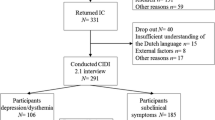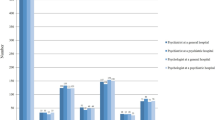Abstract
Purpose of the study is to investigate help-seeking preferences of the Sardinian public in case of depression. A telephone survey was conducted among the adult population, using quota sampling (N = 1,200). Respondents were presented with a vignette depicting a person with symptoms of major depressive disorder, followed by a fully structured interview. Psychologists were most frequently selected as source of professional help, followed by psychiatrists and G.P.s. Residents of small towns more frequently recommended mental health professionals than city residents. Public help-seeking preferences reflect the availability of services, beliefs about the appropriate treatment of depression and attitudes towards those providing it.

Similar content being viewed by others
References
Albo Psicologi-Sardegna (2013) http://www.psicosardegna.it/albo.php.
American Psychiatric Association. (2000). Diagnostic and statistical manual of mental disorders (4th ed.). Washington, D.C.: American Association.
Angermeyer, M. C., & Dietrich, S. (2006). Public beliefs about and attitudes towards people with mental illness: a review of population studies. Acta Psychiatrica Scandinavica, 113, 163–179.
Angermeyer, M. C., Matschinger, H., & Riedel-Heller, S. G. (1999). Whom to ask for help in case of a mental disorder? Preferences of the lay public. Social Psychiatry and Psychiatric Epidemiology, 34, 202–210.
Angermeyer, M. C., Matschinger, H., & Riedel-Heller, S. G. (2001). What to do about mental disorder-help-seeking recommendations of the lay public. Acta Psychiatrica Scandinavica, 103, 220–225.
Angermeyer, M. C., Matschinger, H., & Schomerus, G. (2013). Attitudes towards psychiatric treatment and people with mental illness: Changes over two decades. British Journal of Psychiatry, 203, 146–151.
Blumner, K. H., & Marcus, S. C. (2009). Changing perceptions of depression: Ten-year trends from the genereal social survey. Psychiatric Services, 60, 306–312.
Bromet, E., Andrade, L. H., Hwang, I., Sampson, N. A., Alonso, J., de Girolamo, G., et al. (2011). Cross-national epidemiology of DSM-IV major depressive episode. BMC Medicine, 9, 90.
Carta, M. G., Angermeyer, M. C., Matschinger, H., Holzinger, A., Floris, F., & Moro, M. F. (2013a). Perception of depressive symptoms by the Sardinian public: Results of a population study. BMC Psychiatry, 13, 57.
Carta, M.G., Angermeyer, M.C., Matschinger, H., Holzinger, A., Pintus, E., Pintus, M., & Moro, M.F. (2013b). Recommendations of the Sardinian public for the treatment of depression. International Journal of Social Psychiatry, epub ahead of print.
Carta, M. G., Angermeyer, M. C., Sancassiani, F., Tuligi, F., Pirastu, R., Pisano, A., et al. (2013b). A follow-up on patients with severe mental disorders in Sardinia after two changes in the regional policies: poor resources still correlate with poor outcomes. BMC Psychiatry, 13, 333.
Carta, M. G., Petretto, D., Adamo, S., Bhat, K. M., Lecca, M. E., Mura, G., et al. (2012). Counseling in primary care improves depression and quality of life. Clinical Practice and Epidemiology of Mental Health, 8, 152–157.
Comas, A., & Álvarez, E. (2004). Conocimiento y percepción de la depresión entr la población española [Knowledge and perception about depression in the Spanish population]. Actas Españolas de Psiquiatria, 32, 371–376.
Commissione Regione per la Salute Mentale. (2010). Piano Regionale per la Salute Mentale. Cagliari: Regione Sardegna.
Cossu, N. (2010). A luna calante. Vitalità e prospettive della medicina tradizionale in Sardegna [The waning moon. Vitality and perspectives of traditional medicine in Sardinia]. Cagliari: Argo.
Cuenca, O. (2001). Mass media and psychiatry. Current Opinion in Psychiatry, 14, 527–528.
Diotallevi, L. (2009). The Territorial articulation of secularization in Italy: Social modernization, religious modernization. Archives des Sciences Sociales des Religions, 107, 77–108.
Garro, L. (1986). Decision-making models of treatment choice. In S. McHugh & T. M. Vallis (Eds.), Illness behavior. A multidisciplinary model. New York: Plenum Press.
Gazzetta Ufficiale n. 274 del 22.11.1999. Progetto Obiettivo “Tutela della Salute Mentale 1990-200″ www.salute.gov.it/imgs/C17_pubblicazioni_558_allegato.pdf.
Goldney, R. D., Taylor, A. W., Bain, M. A. (2007). Depression and remoteness from health services in South Australia. Australian Journal of Rural Health, 15(3), 201–210.
Griffiths, K. M., Christensen, H., Jorm, A. F. (2009). Mental health literacy as a function of remoteness of residence: An Australian national study. BMC Public Health, 9, 92.
Holzinger, A., Matschinger, H., & Angermeyer, M. C. (2011). What to do about depression? Help-seeking and treatment recommendations of the public. Epidemiology and Psychiatric Sciences, 20, 163–169.
Italian National Institute of Statistics (ISTAT) (2011). Retrieved from www.istat.it.
Jorm, A. (2000). Mental health literacy: Public knowledge and beliefs about mental disorders. British Journal of Psychiatry, 177, 396–402.
Jorm, A. F., Christensen, H., Medway, J., Korten, A. E., Jacomb, P. A., & Rodgers, B. (2000). Public belief systems about the helpfulness of interventions for depression: associations with history of depression and professional help-seeking. Social Psychiatry and Psychiatric Epidemiology, 35, 211–219.
Kovess-Masféty, V., Wiersma, D., Xavier, M., de Almeida, J. M., Carta, M. G., Dubuis, J., et al. (2006). Needs for care among patients with schizophrenia in six European countries: A one-year follow-up study. Clinical Practice and Epidemiology of Mental Health, 11(2), 22.
Long, S. J., & Freese, J. (2006). Regression models for categorical dependent variable using STATA (2nd ed.). College Station, TX: Stata Press.
Mnich, E., Makowski, A. C., Lambert, M., Angermeyer, M. C., & von dem Knesebeck, O. (2014). Beliefs about depression: Do affliction and treatment experience matter? Results of a population survey from Germany. Journal of Affective Disorders, 164, 28–32.
Munizza, C., Argentero, P., Coppo, A., Tibaldi, G., Di Giannantonio, M., Picci, R. L., et al. (2013). Public beliefs and attitudes towards depression in Italy: A national survey. PLoS ONE, 8(5), e63806.
Murray, C. J., & Lopez, A. D. (Eds.). (1996). The global burden of disease: A comprehensive assessment of mortality and disability from diseases, injuries, and risk factors in 1990 and projected to 2020. Cambridge, MA: Harvard University Press.
Parabiaghi, A., Rapisarda, F., D’Avanzo, B., Erlicher, A., Lora, A., & Barbato, A. (2011). Measuring clinical change in routine mental health care: Differences between first time and longer term service users. Australian and New Zealand Journal of Psychiatry, 45, 558–568.
Peluso, E. T., & Blay, S. L. (2009). Public beliefs about the treatment of schizophrenia and depression in Brazil. International Journal of Social Psychiatry, 55, 16–27.
Reavley, M. J., & Jorm, A. F. (2011). Recognition of mental disorders and beliefs about treatment and outcome: Findings from an Australian National Survey of Mental Health Literacy and Stigma. Australian and New Zealand Journal of Psychiatry, 45, 947–956.
Rizzo, R., Piccinelli, M., Mazzi, M. A., Bellantuono, C., & Tansella, M. (2000). The personal health questionnaire: A new screening instrument for detection of ICD-10 depressive disorders in primary care. Psychological Medicine, 30, 831–840.
Sartorius, N., Gaebel, W., Cleveland, H.-R., Stuart, H., Akiyama, T., Arboleda-Flórez, J., et al. (2010). WPA guidance on how to combat stigmatization of psychiatry and psychiatrists. World Psychiatry, 9, 131–144.
Schomerus, G., Matschinger, H., & Angermeyer, M. C. (2009). The stigma of psychiatric treatment and help-seeking intentions for depression. European Archives of Psychiatry and Clinical Neuroscience, 259, 298–306.
Sharpley, C. E. (1986). Public perceptions of four mental health professions: A survey of knowledge and attitudes to psychologists, psychiatrists, social workers and counselors. Australian Psychologist, 21, 57–67.
Statacorp. (2011). Stata Statistical Software. Release 12. College Station, TX: Stata Press.
Swami, V., & Furnham, A. (2011). Preliminary investigation of the psychometric properties of the psychiatric skepicisim scale. Scandinavian Journal of Psychology, 52, 399–403.
Wang, P. S., Aguilar-Gaxiola, S., Alonso, J., Angermeyer, M. C., Borges, G., Bruffaerts, R., et al. (2008). Delay and failure in treatment seeking after first onset of mental disorders in the World Mental Health Survey Initiative. In R. C. Kessler & T. B. Üstün (Eds.), The WHO World Mental Health Surveys (pp. 522–533). New York: Cambridge University Press.
Xu, J., & Long, S. J. (2005). Confidence intervals for predicted outcomes in regression models for categorical outcomes. Stata Journal, 5, 537–559.
Yap, M. B., Reavley, N., & Jorm, A. F. (2013). Where would young people seek help for mental disorders and what stops them? Findings from an Australian national survey. Journal of Affective Disorders, 147, 255–261.
Acknowledgments
We are grateful to Emilio Del Giudice for programing the interview. We also want to thank all the interviewers: Laura Aresu, Francesca Atzei, Giovanna Cabras, Paola Carrus, Luisa Farris, Francesca Floris, Laura Pilutzu, Daniela Moro, Annalisa Motzo, Alessandra Pingiori, Elisa Pintus, Mirra Pintus and Franca Vargiu.
Conflict of interest
None.
Author information
Authors and Affiliations
Corresponding author
Electronic supplementary material
Below is the link to the electronic supplementary material.
Rights and permissions
About this article
Cite this article
Moro, M.F., Angermeyer, M.C., Matschinger, H. et al. Whom to Ask for Professional Help in Case of Major Depression? Help-Seeking Recommendations of the Sardinian Public. Adm Policy Ment Health 42, 704–713 (2015). https://doi.org/10.1007/s10488-014-0604-y
Published:
Issue Date:
DOI: https://doi.org/10.1007/s10488-014-0604-y




